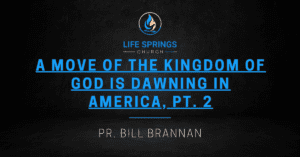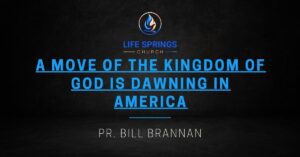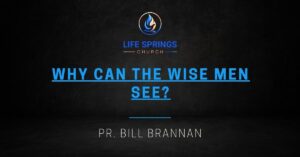The Hidden Costs of Restoring the World Through Faith

In a world often overshadowed by despair, Pastor Bill Brannan’s message urges us to consider the profound implications of restoring society through the Gospel of Jesus Christ. This blog delves into the transformative power of faith, hope, and love, and the challenges we face as we strive to create a kingdom that reflects God’s values.
Introduction
In our quest to restore the world through faith, we must confront the deep-rooted challenges that lie ahead. It is not just about individual restoration; it is about a collective transformation that aligns with God’s vision for humanity. This journey asks us to examine our beliefs and the actions we take in our communities. By understanding our mission, we can actively participate in the restoration of human flourishing that reflects the life of Christ.
David’s Mighty Men
David’s Mighty Men serve as a powerful illustration of loyalty and courage. These men were not just warriors; they were disciples who embodied David’s vision of a different kingdom. When David expressed his longing for water from the well of Bethlehem, these men risked their lives to fulfill his desire. This act was more than a gesture; it was a reflection of their commitment to a leader who represented a kingdom governed by values contrary to the world.
Photo by henri meilhac on Unsplash
The Significance of Sacrifice
David’s decision to pour out the water rather than drink it symbolizes a profound understanding of sacrifice. He recognized that true leadership is not about personal gain but about honoring those who serve and protecting their dignity. This act teaches us that the path to restoration often requires us to prioritize the well-being of others over our own desires.
Discerning the Kingdom of God
Discerning the kingdom of God is crucial for believers. It requires a deep understanding of God’s values and how they contrast with worldly principles. The challenge lies in recognizing what truly belongs to the kingdom and what does not. This discernment shapes our actions and informs our commitment to living out our faith in a way that reflects God’s love and justice.
Photo by Ashley Batz on Unsplash
Recognizing Spiritual Discernment
- Understanding God’s Will: We must seek to understand how God governs from heaven and how we can manifest that on earth.
- Awareness of Worldly Models: Many are tempted to follow the paths of worldly success, but we must resist this urge.
- Building a Kingdom of Love: Our actions should reflect the love and justice of God, distinguishing us from the world’s standards.
Transitioning Israel
The transition from a kingdom governed by worldly wisdom to one led by God’s principles is fraught with challenges. David faced immense obstacles in his leadership journey, often met with resistance from his own men. This transition requires unwavering faith and a commitment to God’s vision, even when the path is unclear.
Photo by Taylor Brandon on Unsplash
David’s Leadership Challenges
David’s leadership was characterized by moments of doubt and fear. His men often struggled to understand the vision he was trying to establish. Yet, through perseverance and faith, David continued to lead them towards a greater understanding of God’s kingdom.
Photo by Nick Fewings on Unsplash
Journey Through Difficulty
The journey of faith is not always easy. Believers face trials that test their commitment to God’s mission. It is essential to navigate these difficulties with hope and determination, knowing that they serve a greater purpose in the restoration process.
Photo by Vlad Bagacian on Unsplash
Faith in Adversity
- Embracing Challenges: Trials can strengthen our faith and draw us closer to God.
- Maintaining Hope: We must hold onto the belief that our efforts contribute to a larger purpose.
- Finding Joy in Struggles: Even in hardships, we can experience joy and peace through Christ.
The Greatest of These is Love
At the heart of our mission is love. The greatest commandment calls us to love God and love our neighbors. This love is transformative and essential for the restoration of humanity. It compels us to act, to reach out, and to bring hope to those in need.
Photo by Mandy von Stahl on Unsplash
Growing in Love
To reproduce the life of Christ, we must cultivate love in our hearts. This growth is a process, requiring intentional effort and a willingness to serve others. As we deepen our understanding of God’s love, we become more equipped to share it with the world.
Photo by Shaira Dela Peña on Unsplash
Church Needs to Change
The church must embrace change to fulfill its mission of restoration. This requires a willingness to rethink traditional approaches and adopt new strategies that align with God’s vision. Change is often met with resistance, but it is necessary for growth and relevance in our communities.
Photo by Debby Hudson on Unsplash
Embracing New Ideas
- Innovative Approaches: We must be open to exploring new methods of outreach and service.
- Community Engagement: Building relationships within our communities can lead to impactful change.
- Faithful Experimentation: Trying new things, even at the risk of failure, is essential for progress.
Church Divided by Politics
One of the most pressing challenges facing the church today is the division along political lines. This division often distracts from our core mission of love and restoration. To move beyond this, we must focus on our shared identity in Christ rather than our differences.
Photo by Debby Hudson on Unsplash
Bridging Divides
Building a community that transcends political affiliations requires intentional effort. We must seek common ground and engage in open, respectful dialogue. This approach fosters understanding and unity, allowing us to work together towards our shared mission.
Photo by Vonecia Carswell on Unsplash
Bringing Worth and Dignity to the World
Our mission extends beyond the walls of the church; it involves bringing worth and dignity to every individual. Each person is created in the image of God and deserves to be treated with respect and love. This commitment drives our efforts to restore human flourishing in a world that often overlooks the marginalized.
Advocating for Justice
- Empowering the Marginalized: We must advocate for those who are often ignored or oppressed.
- Creating Inclusive Communities: Our churches should reflect the diversity of God’s creation.
- Living Out Our Faith: Demonstrating love in action is essential to restoring dignity and worth.
Church Panders to the Flesh
In many congregations, there’s a tendency to pander to the flesh. This approach often prioritizes entertainment and emotional highs over genuine spiritual growth. While engaging worship and uplifting messages can draw people in, they can also create an environment where the focus shifts from transformation to mere comfort.
Photo by Karl Fredrickson on Unsplash
When churches cater to the desire for feel-good experiences, they risk producing congregants who are spiritually undernourished. It’s essential to recognize that true spiritual maturity requires more than just enjoyable services. It demands a commitment to deeper truths and transformative teachings that challenge us to grow in our faith.
Photo by Nathan Anderson on Unsplash
Consequences of Flesh-Pandering
- Superficial Faith: Members may develop a shallow understanding of their faith, relying on emotions rather than solid biblical foundations.
- Lack of Accountability: When the focus is on comfort, accountability diminishes, leading to unchecked behaviors and attitudes.
- Stagnation: Without challenges that provoke growth, individuals may become stagnant in their spiritual journey.
Church and Self-Importance
The issue of self-importance within the church is another barrier to genuine community and growth. When individuals seek recognition or status, it can lead to a toxic environment where hierarchy overshadows humility. This mentality often manifests in the pursuit of titles and positions rather than serving the body of Christ.
Photo by Autumn Goodman on Unsplash
Understanding that every member of the church plays an essential role is crucial. No one calling is more significant than another; God values every contribution equally. When the church embraces this truth, it fosters an environment where humility flourishes over self-importance.
Photo by Brooke Cagle on Unsplash
Overcoming Self-Importance
- Emphasize Community: Encourage members to focus on building relationships rather than seeking status.
- Celebrate All Roles: Acknowledge and appreciate the contributions of all members, regardless of their position.
- Promote Servanthood: Teach the importance of serving others as the highest calling within the church.
Church and Self-Interest
Self-interest can subtly infiltrate the church, leading to a focus on personal gain rather than collective benefit. When individuals attend church primarily for what they can receive, the mission of the church can become distorted. This mindset can create divisions and hinder the church’s ability to serve its community effectively.
Photo by Ivana Cajina on Unsplash
To combat self-interest, the church must foster a culture of sacrificial love and service. When individuals prioritize the needs of others, they contribute to a healthier, more vibrant community that reflects the heart of the Gospel.
Photo by Helena Lopes on Unsplash
Shifting Focus from Self-Interest
- Encourage Generosity: Teach the importance of giving time, resources, and talents to benefit others.
- Promote Teamwork: Foster collaborative efforts that encourage members to work together for a common goal.
- Highlight Community Needs: Regularly share the needs of the local community to inspire action and engagement.
Dependence on God
True dependence on God is vital for the health of the church. Many congregants may rely on church leaders for spiritual guidance, but it’s essential for each individual to cultivate their personal relationship with God. This dependence empowers believers to make decisions based on their convictions rather than merely following the crowd.
Photo by Guillaume de Germain on Unsplash
Encouraging personal prayer and study of the Word can foster a more profound sense of dependence on God. When individuals learn to hear His voice and trust His guidance, they become more effective instruments for His work.
Building Dependence on God
- Encourage Personal Prayer: Foster a culture where personal prayer is valued and practiced regularly.
- Promote Scripture Engagement: Encourage members to read and meditate on Scripture to deepen their understanding of God’s will.
- Share Testimonies: Create opportunities for individuals to share how they have heard from God, reinforcing the idea that everyone can have a personal relationship with Him.
Challenges in Ministry
Ministry is fraught with challenges that can test the resolve of even the most dedicated individuals. From managing conflict to addressing the diverse needs of the congregation, the demands placed on church leaders can be overwhelming. However, these challenges also present opportunities for growth and deeper faith.
Photo by Katarzyna Grabowska on Unsplash
Recognizing that challenges are a part of the ministry journey can help leaders and congregants alike to approach them with a sense of purpose. By leaning into these difficulties, they can experience God’s faithfulness and provision.
Photo by Akira Hojo on Unsplash
Addressing Ministry Challenges
- Open Communication: Foster an environment where concerns can be discussed openly and honestly.
- Seek Support: Encourage leaders to seek support from one another and from the congregation.
- Focus on Solutions: Rather than dwelling on problems, emphasize finding solutions together as a community.
Practical Ways to Contribute
Every member of the church has a unique role to play in advancing the mission. Practical contributions can range from volunteering for events to simply offering a listening ear to someone in need. By actively engaging in the life of the church, individuals can help create a thriving community.
Photo by Edwin Andrade on Unsplash
Encouraging members to identify their gifts and passions can lead to more meaningful contributions. When individuals serve in areas they are passionate about, it not only benefits the church but also brings personal fulfillment.
Photo by Brooke Cagle on Unsplash
Ways to Get Involved
- Volunteer for Events: Participate in church events and outreach programs to foster community connections.
- Join a Small Group: Engage with others in small groups to build relationships and support one another.
- Share Your Gifts: Identify and utilize your unique talents to serve the church and its mission.
Finding Joy in the Mission
Finding joy in the mission is essential for sustaining long-term engagement in ministry. When individuals recognize the significance of their contributions, they can experience joy that transcends circumstances. This joy can be contagious, inspiring others to engage and serve alongside them.
Photo by Helena Lopes on Unsplash
Joy in the mission comes from a deep understanding of the impact one’s efforts can have on others. When people see lives transformed through their service, it reinforces the value of their work and encourages them to continue.
Photo by Nathan Anderson on Unsplash
Cultivating Joy in the Mission
- Celebrate Wins: Take time to celebrate the successes and milestones achieved as a community.
- Encourage Gratitude: Foster an attitude of gratitude, recognizing the blessings that come from serving others.
- Share Stories: Regularly share testimonies of how the mission has impacted lives to inspire continued engagement.
Succeeding in the Mission of God
Success in the mission of God is not measured by attendance numbers or financial contributions but by the transformation of lives and communities. Each small act of service adds up to create a significant impact. When individuals and the church as a whole commit to this mission, the results can be profound.
Photo by Dylan Gillis on Unsplash
By focusing on the mission and working together, churches can effectively restore hope and bring about change in their communities. This collective effort reflects the heart of the Gospel and fulfills God’s calling for His people.
Keys to Succeeding in God’s Mission
- Stay Focused on the Mission: Regularly remind the congregation of the mission and its importance.
- Encourage Collaboration: Foster partnerships within the community to amplify efforts and reach more people.
- Evaluate Progress: Periodically assess how well the church is fulfilling its mission and make necessary adjustments.
Restoring the World by Reproducing the Life of Christ
(Preaching Outline)
MISSION:
Becoming a community that restores the world by reproducing the life of Christ with imperfect people growing in grace and serving through the gift of the Spirit.
VISION:
To restore human flourishing through the gospel of Jesus Christ.
“We are to grow up in all aspects into Him, who is the head, even Christ, from whom the whole body, being fitted and held together by that which every joint supplies, according to the proper working of each individual part, causes the growth of the body for the building up of itself in love.” (Ephesians 4:15–16, NASB)
I am going to preach a series of messages that will connect with our mission and vision in various ways.
1) To own the mission of restoring the world by reproducing the life of Christ takes on a journey that is out of sync with the current church world.
2) I want to begin by reading 2 Samuel 23:13–17 (NKJV) — 13 Then three of the thirty chief men went down at harvest time and came to David at the cave of Adullam. And the troop of Philistines encamped in the Valley of Rephaim. 14 David was then in the stronghold, and the garrison of the Philistines was then in Bethlehem. 15 And David said with longing, “Oh, that someone would give me a drink of the water from the well of Bethlehem, which is by the gate!” 16 So the three mighty men broke through the camp of the Philistines, drew water from the well of Bethlehem that was by the gate, and took it and brought it to David. Nevertheless he would not drink it, but poured it out to the Lord. 17 And he said, “Far be it from me, O Lord, that I should do this! Is this not the blood of the men who went in jeopardy of their lives?” Therefore he would not drink it. These things were done by the three mighty men.
a) Context of David’s Statement
i) After 2 Samuel records David’s last words, then it recounts the deeds of his mighty men.
ii) Led the armies of Israel in battle, and had married the daughter of Saul
iii) Then Saul sought to kill him
iv) Fled to Achish in Gath, pretended madness, scratched doors and drooled.
v) The challenge of faith – the calling and anointing and the trouble.
vi) Remembered the simplicity and joy of youth and spoke about water from the well of Bethlehem.
b) The kingdom challenge – 1 Corinthians 2:14 (NKJV) — 14 But the natural man does not receive the things of the Spirit of God, for they are foolishness to him; nor can he know them, because they are spiritually discerned.
c) The difficulties faced by his mighty men.
i) Keilah, Saul handed over, not belonging to the current order, Culminating in Ziklag.
d) OUR PERSONAL JOURNEYS
e) OUR CORPORATE JOURNEY
f) THE KINGDOM OF GOD AND THE KINGDOM OF THIS WORLD
g) I am going to frame this next section around the passage: 1 Corinthians 13:13 (NKJV) — 13 And now abide faith, hope, love, these three; but the greatest of these is love.
3) The challenge of dreaming of going against the grain because of the hope of a better world.
a) The challenge of believing that Christianity can have a much greater impact on the world but to accomplish this, we need to have the courage to go against the grain.
b) Some of what is common in the church.
i) Political lines
ii) Worship and emotion
iii) Social mobility
iv) Feeling special because of doctrines or forms.
v) Hierarchy and self-importance
vi) Cult of personality
vii) Dependence
c) The challenges we face in seeking to restore the world by reproducing the life of Christ.
i) Not what grows churches today.
ii) The challenge of a crowd attracts a crowd.
iii) We have to believe in the mission and vision if we are going to succeed.
4) We also need practical ways we can contribute to our mission and vision.
a) Acts 2:46–47 (NKJV) — 46 So continuing daily with one accord in the temple, and breaking bread from house to house, they ate their food with gladness and simplicity of heart, 47 praising God and having favor with all the people. And the Lord added to the church daily those who were being saved.
b) Romans 14:17–18 (NKJV) — 17 for the kingdom of God is not eating and drinking, but righteousness and peace and joy in the Holy Spirit. 18 For he who serves Christ in these things is acceptable to God and approved by men.
c) 1 Thessalonians 5:16–18 (NKJV) — 16 Rejoice always, 17 pray without ceasing, 18 in everything give thanks; for this is the will of God in Christ Jesus for you.
5) The perseverance required to fulfill such a dream.
a) Habakkuk 3:17–19 (NKJV) — 17 Though the fig tree may not blossom, Nor fruit be on the vines; Though the labor of the olive may fail, And the fields yield no food; Though the flock may be cut off from the fold, And there be no herd in the stalls— 18 Yet I will rejoice in the Lord, I will joy in the God of my salvation. 19 The Lord God is my strength; He will make my feet like deer’s feet, And He will make me walk on my high hills. To the Chief Musician. With my stringed instruments.
b) A prophet is one who sees the future in the present, the end already implicit in the beginning. While others are at ease, he foresees the catastrophe. While others are mourning the catastrophe, he can already see the eventual consolation. There is a famous example of this in the Talmud. Rabbi Akiva is walking with his colleagues on Mount Scopus when they see the ruins of the Temple. They weep. He smiles. When they ask him why he is smiling, he replies: “Now that I have seen the realization of the prophecies of destruction, shall I not believe in the prophecies of restoration?”[1]
c) Galatians 6:9–10 (NKJV) — 9 And let us not grow weary while doing good, for in due season we shall reap if we do not lose heart. 10 Therefore, as we have opportunity, let us do good to all, especially to those who are of the household of faith.
d) What we have already
e) What we will explore in the future
f) Restoring the world by reproducing the life of Christ.
[1] Sacks, Jonathan. Ceremony & Celebration: Introduction to the Holidays (Covenant & Conversation Book 6) (p. 202). the Toby Press. Kindle Edition.
[/et_pb_toggle][/et_pb_column][/et_pb_row][/et_pb_section]







































